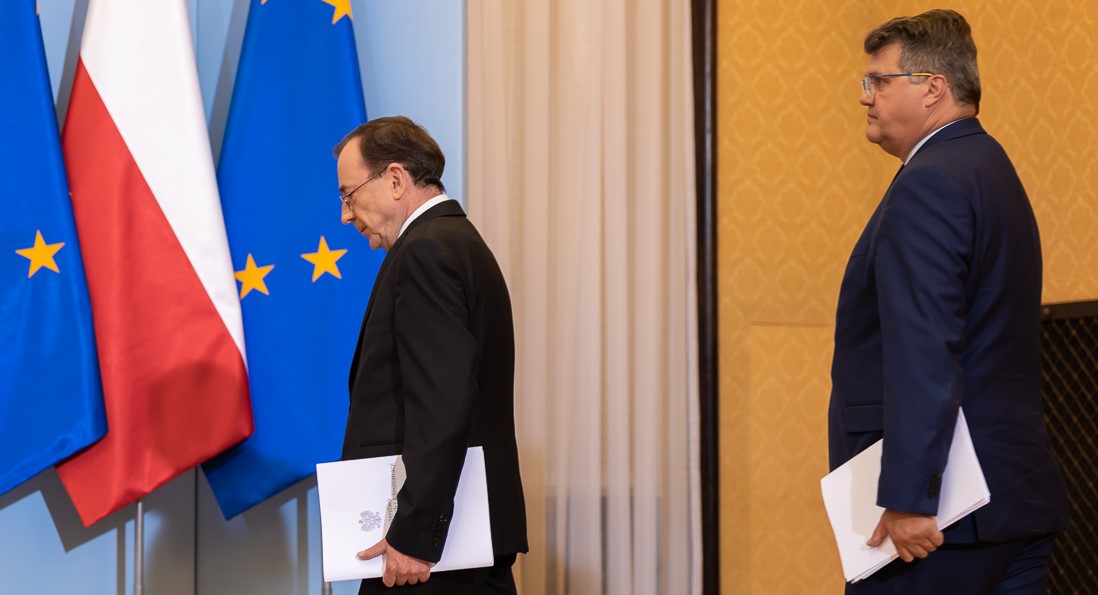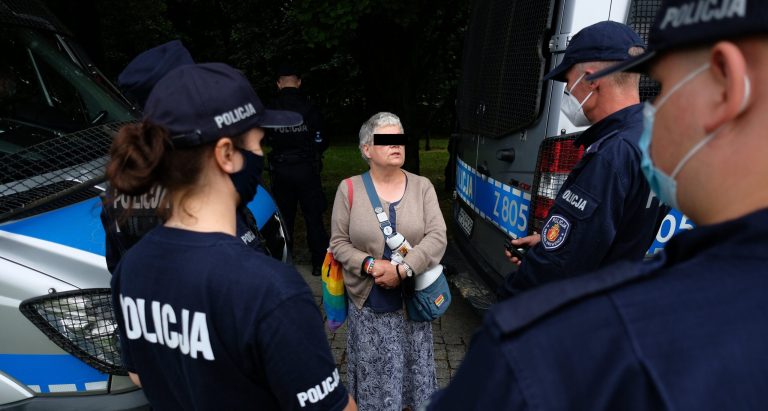Supreme Court chamber confirms expiry of convicted MP’s mandate, contradicting other chamber

A chamber of Poland’s Supreme Court has rejected an MP’s appeal against the expiration of his parliamentary mandate due to him receiving a criminal conviction. The decision comes after another chamber of the same court made the opposite ruling last week on the same case.
The development highlights – and adds to – the chaos and confusion surrounding Poland’s court system after a new government last month took power following eight years of rule by the Law and Justice (PiS) party. PiS undertook a radical overhaul of the judiciary, many parts of which have been found to be unlawful.
Today’s ruling also creates further complexities in the case of the MP in question, Mariusz Kamiński, a former PiS government minister, who was yesterday jailed but who insists that his conviction and the consequent expiration of his parliamentary mandate are invalid because he received a presidential pardon.
One of the convicted former PiS government ministers detained yesterday at the presidential palace and taken to jail has announced a hunger strike, declaring himself to be a “political prisoner” https://t.co/hey8320QBV
— Notes from Poland 🇵🇱 (@notesfrompoland) January 10, 2024
On Wednesday morning, the labour chamber of the Supreme Court announced that it had rejected Kamiński’s appeal against the decision by the speaker of parliament, Szymon Hołownia, to confirm the expiration of Kamiński’s parliamentary mandate.
One of the judges, Bohdan Bieniek, noted that it is not the Supreme Court’s role to verify whether or not the final conviction issued against Kamiński is correct or not. “The expiration of an MP’s mandate takes place by operation of law, which the speaker confirms only by way of a declaratory decision,” said Bieniek.
In today’s ruling, the labour chamber also declared that the Supreme Court’s extraordinary oversight and public affairs chamber – which last week ruled in favour of Kamiński in the same case – “does not have the status of an independent and impartial court previously established under the law”.
The extraordinary oversight and public affairs chamber’s “statements are not acts applying the law”, wrote Bieniek in the justification for today’s ruling, cited by broadcaster TVN 24.
#PILNE | Izba Pracy i Ubezpieczeń Społecznych Sądu Najwyższego rozpatrzyła sprawę mandatu poselskiego Mariusza Kamińskiego. Nie uwzględniła odwołania posła od decyzji marszałka Sejmu o wygaszeniu mandatu.https://t.co/khUCJKBh9a pic.twitter.com/FRBYUr3QUc
— tvn24 (@tvn24) January 10, 2024
The conflict between the two chambers stems from the overhaul of the judiciary undertaken by the former PiS government, and in particular its reforms to the National Council of the Judiciary (KRS), the body responsible for nominating judges.
A number of Polish and European court rulings have found that those reforms, which increased politicians’ influence over the KRS, rendered the body illegitimate. That has in turn cast doubt on the status of judges subsequently appointed by it.
The extraordinary oversight and public affairs chamber, a body also created by PiS, is staffed entirely by such “new” judges appointed by the reformed KRS.
Both the Court of Justice of the European Union (CJEU) and the European Court of Human Rights (ECHR) have as a result found the chamber to not be a lawfully established body.
A chamber of the Supreme Court created by the former PiS government is „not a tribunal established by law”, the EU’s top court has found.
The same chamber is due next month to rule on the validity of the recent elections at which PiS lost power https://t.co/gXgHSobD8C
— Notes from Poland 🇵🇱 (@notesfrompoland) December 22, 2023
When Kamiński and Maciej Wąsik – his PiS colleague and former deputy minister who was also convicted in the same case – appealed against Hołownia’s decision to confirm the expiration of their mandates, the speaker directed those appeals to the Supreme Court’s labour chamber.
However, under PiS’s judicial reforms, it is the extraordinary oversight and public affairs chamber that should assess such cases. As such, the three “new” judges in the labour chamber assigned to Wąsik’s case transferred it to the extraordinary oversight and public affairs chamber.
On Thursday last week, that latter chamber accepted Wąsik’s appeal. By contrast, Kamiński’s case was assigned to three “old” judges (appointed before PiS’s overhaul of the KRS) in the labour chamber. It was they who issued today’s ruling.
However, Kamiński’s legal team argued that his appeal should be considered by the extraordinary oversight and public affairs chamber. The Supreme Court’s chief justice, Małgorzata Manowska – also a “new” judge – agreed.
As a result, that chamber last Friday also ruled on Kamiński’s case, accepting his appeal against Hołownia’s decision to confirm the expiration of Kamiński’s parliamentary mandate.
The Supreme Court chief justice – who was appointed under the former PiS government – has accused the speaker of parliament – who is part of the new ruling coalition – of “illegal actions” regarding two former PiS ministers recently given prison sentences https://t.co/3n5ctfjHON
— Notes from Poland 🇵🇱 (@notesfrompoland) January 8, 2024
The situation highlights what many experts have warned about, which is that the fact that many of PiS’s judicial reforms have been found to be unlawful by Polish and European judges has resulted in a dual legal system.
That often means that certain judges and certain rulings are not being recognised as legitimate by one side or the other. In some cases, such as Kamiński’s, it can produce completely contradictory rulings on the same issue.
A similar situation has arisen regarding Duda’s decision to pardon Kamiński and Wąsik. Last June, one Supreme Court chamber ruled that it was invalid. But, the very same month, another top court, the Constitutional Tribunal, ruled that the Supreme Court did not have the right to question a presidential pardon.
Meanwhile, last week’s rulings by the Supreme Court’s extraordinary oversight and public affairs chamber in support of Kamiński and Wąsik’s appeals effectively recognised Duda’s pardons as valid, contradicting last June’s ruling by another Supreme Court chamber.
Thirty judges on Poland’s Supreme Court – almost a third of those working at the institution – have declared they will not adjudicate alongside colleagues appointed after the government’s judicial overhaul, which they say rendered such nominations invalid https://t.co/jsFW62gWih
— Notes from Poland 🇵🇱 (@notesfrompoland) October 17, 2022
Notes from Poland is run by a small editorial team and published by an independent, non-profit foundation that is funded through donations from our readers. We cannot do what we do without your support.
Main image credit: MSWiA (under CC BY-NC-ND 3.0 PL)

Daniel Tilles is editor-in-chief of Notes from Poland. He has written on Polish affairs for a wide range of publications, including Foreign Policy, POLITICO Europe, EUobserver and Dziennik Gazeta Prawna.






